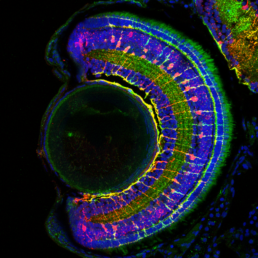CSB Chair Vincent Tropepe has received funding from Fighting Blindness Canada to conduct research using zebrafish to study Usher syndrome, a genetic condition that results in hearing and vision loss. Loss of vision in Usher syndrome is the result of retinal degeneration, but the mechanism through which degeneration happens in unknown.
Clues to the way retinal degeneration happens in Usher syndrome can be found in the zebrafish model organism. The gene that is altered in 20% of humans with Usher syndrome is also present in zebrafish, and mutations in zebrafish that mimic the Usher-linked changes in this ‘protocadherin’ gene can result in reduced hearing and vision.
When the zebrafish protocadherin protein Pcdh15b is mutated in the lab, the integrity of the outer segment of retinal cells, the region that captures light, is compromised. Mutants have a progressive loss of photoreceptor outer segments, which can be attenuated by darkness or exacerbated by light exposure.
The Tropepe lab will characterize the subcellular defects that underscore photoreceptor degeneration, identify Pcdh15b-binding proteins to reveal novel Pcdh15-dependent mechanisms for photoreceptor maintenance, and catalogue the different forms of Pcdh15b to identify ones that will prevent retinal degeneration as a potential gene therapy.
We are grateful to Fighting Blindness Canada for their support; you can read more about their funded research and also donate to them here.

